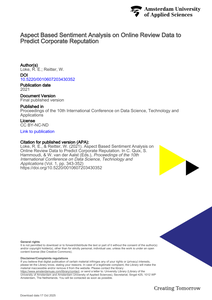Corporate reputation is an intangible resource that is closely tied to an organization’s success but measuring it and to derive actions that can improve the reputations can be a long and expensive journey for an organization. In the available literature, corporate reputation is primarily measured through surveys, which can be time and cost intensive. This paper uses online reviews on the web as the source for a machine-learning driven aspect-based sentiment analysis that can enable organizations to evaluate their corporate reputation on a fine-grained level. The analysis is done unsupervised without organizations needing to manually label datasets. Using the insights generated through the analysis, on one hand, organizations can save costs and time to measure corporate reputation, and, on the other hand, it provides an in-depth analysis that splits the overall reputation into multiple aspects, with which organizations can identify weaknesses and in turn improve their corporate reputa tion. Therefore, this research is relevant for organizations aiming to understand and improve their corporate reputation to achieve success, for example, in form of financial performance, or for organizations that help and consult other organizations on their journeys to increased success. Our approach is validated, evaluated and illustrated with Trustpilot review data.
DOCUMENT

In the era of social media, online reviews have become a crucial factor influencing the exposure of tourist destinations and the decision-making of potential tourists, exerting a profound impact on the sustainable development of these destinations. However, the influence of review valence on visit intention, especially the role of affective commitment and reputation (ability vs. responsibility), remains unclear. Drawing on emotion as a social information theory, this paper aims to elucidate the direct impact of different review valences on tourists’ visit intentions, as well as mediating mechanisms and boundary conditions. Three experiments indicate that positive (vs. negative) reviews can activate stronger affective commitment and visit intention, with affective commitment also playing a mediating role. Additionally, destination reputation significantly moderates the after-effects of review valences. More specifically, a responsibility reputation (compared with an ability reputation) weakens the effect of negative valence on affective commitment and visit intention. This study provides valuable theoretical insights into how emotional elements in online reviews influence the emotions and attitudes of potential tourists. Particularly for tourism managers, review valence and responsibility reputation hold practical significance in destination marketing.
MULTIFILE
Corporate reputation is becoming increasingly important for firms; social media platforms such as Twitter are used to convey their message. In this paper, corporate reputation will be assessed from a sustainability perspective. Using sentiment analysis, the top 100 brands of the Netherlands were scraped and analyzed. The companies were registered in the sustainable industry classification system (SICS) to perform the analysis on an industry level. A semantic search tool called Open Semantic Desktop Search was used to filter through the data to find keywords related to sustainability and corporate reputation. Findings show that companies that tweet more often about corporate reputation and sustainability receive overall a more positive sentiment from the public.
DOCUMENT
